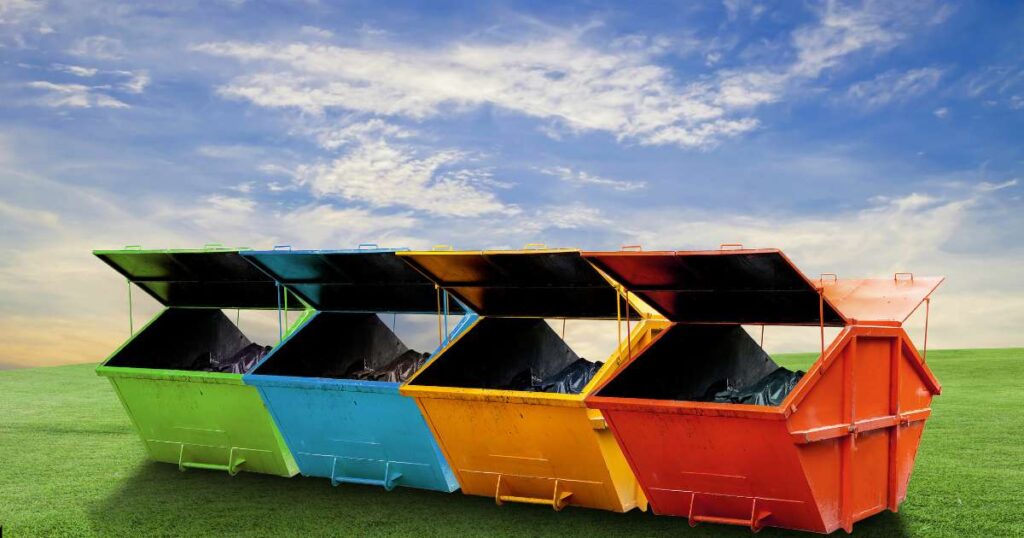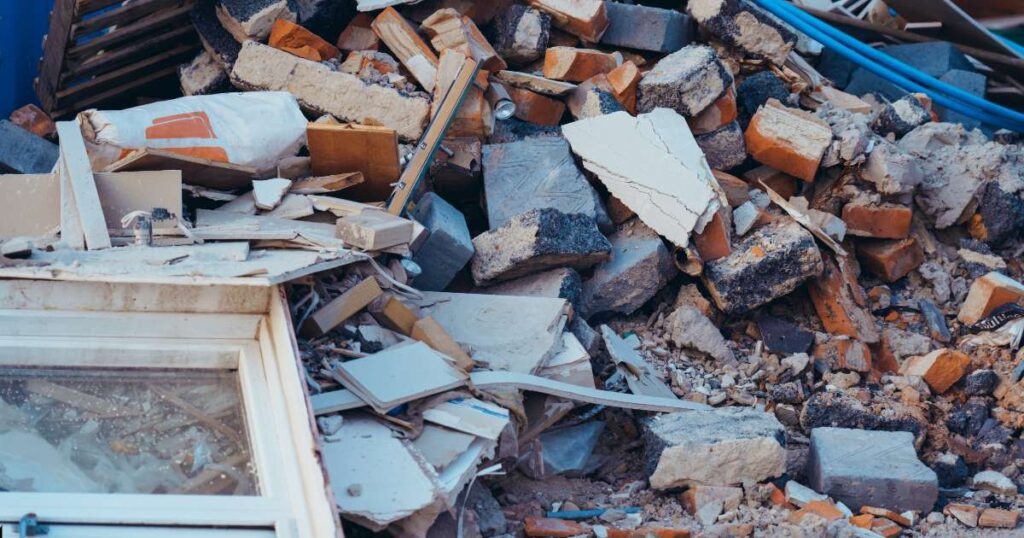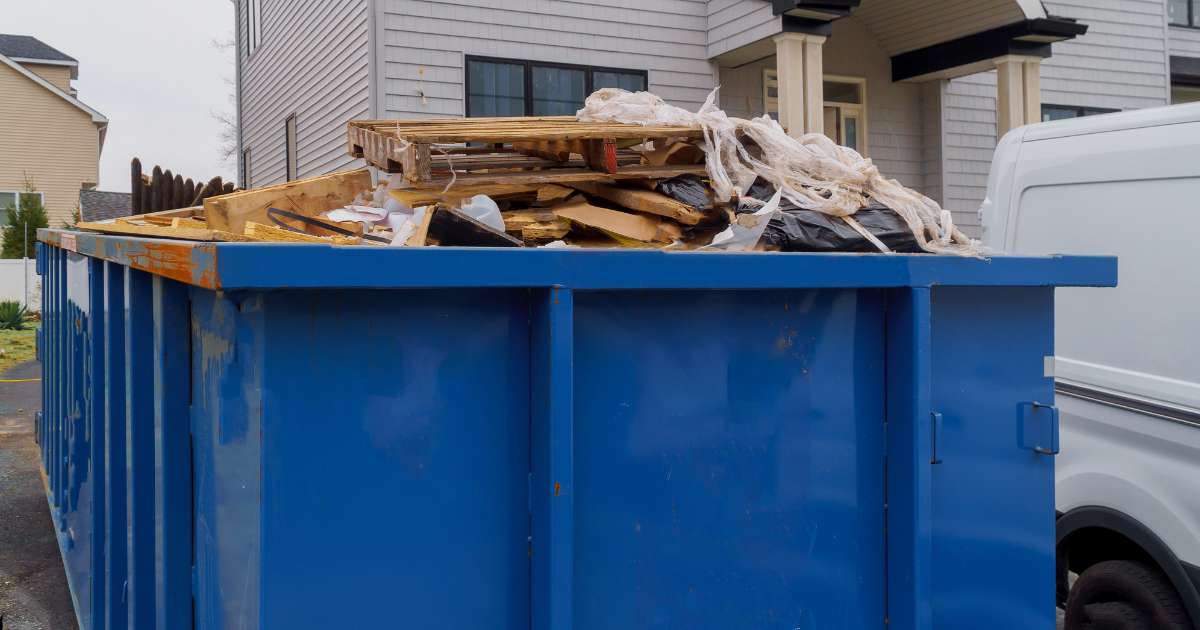When it comes to renting a construction dumpster, understanding the costs involved is crucial for effective budgeting. On average, a roll-off dumpster rental will set you back around $642 per week, with prices typically ranging between $426 and $857.
The final cost depends on factors like the dumpster size, the type of waste you’re disposing of, and your location. In this post, we’ll break down the average rental prices based on these factors, so you can plan your budget accurately and ensure you’re getting the best value.
We’ll also guide you through selecting the right dumpster size and weight capacity for your project, along with tips on securing the best deal.
Understanding Roll-Off Dumpster Rental Prices
Roll-off dumpsters, known for their convenient wheels, are ideal for a variety of projects, from large-scale construction to residential cleanups. These dumpsters are delivered to your location, and once filled, they’re promptly hauled away, making waste disposal simple and efficient.
Discover the Range of Roll-Off Dumpsters
Before discussing the costs, it’s essential to recognize that the price of roll-off dumpster rentals can fluctuate due to various factors. These include the company you select, the availability of dumpsters, and how early you make the reservation.
Generally, rental fees cover important charges such as delivery and pickup, landfill and dumping fees, administrative costs, and a specific tonnage allowance for your waste.

What Influences Roll-Off Dumpster Rental Costs?
The cost of renting a roll-off dumpster isn’t one-size-fits-all; it fluctuates depending on various aspects like the size of the dumpster, the location, and the type of waste you need to dispose of.
Here’s a detailed breakdown to help you better understand what you might expect to pay:
By Size:
Larger dumpsters naturally come with a higher price tag, as they can accommodate more material. Below is an overview of common roll-off dumpster sizes, along with their average weekly rental costs:
15) yard: $596
20) yard: $664
30-yard: $778
40-yard: $916
The smallest option typically starts at 10 yards, but some companies might offer smaller sizes, ranging from 2 to 10 yards, depending on your needs.
By Location:
Where you live plays a significant role in the cost of a roll-off dumpster rental. Prices can vary considerably across different regions due to factors like local demand, disposal costs, and municipal regulations.
By Type of Waste:
The type of material you’re disposing of also affects the rental cost. For instance, heavy materials such as bricks, concrete, or dirt often require special handling and may not be mixed with other types of waste. As a result, dumpsters for heavy debris tend to be more expensive. Here’s a glance at average costs for common types of waste:
Household Trash and Yard Waste:
10-yard: $503
15-yard: $588
20-yard: $620
30-yard: $732
40-yard: $863
Construction Debris:
10-yard: $598
15-yard: $628
20-yard: $844
30-yard: $916
40-yard: $1,076
Additional Cost Factors:
Several other factors might increase the overall cost of your dumpster rental:
Extra Weight: If your waste exceeds the dumpster’s weight limit, expect to pay overage fees. For instance, the average cost per additional ton varies by dumpster size, with a 10-yard typically costing around $63.70 extra per ton.
Extended Rental Duration: Should you need the dumpster for longer than the standard 7 to 10 days, you’ll incur additional charges per day.
Prohibited Items: Disposing of items not allowed by the landfill, such as hazardous materials or certain large appliances, can result in hefty fines. Learn more about whether electronics can be thrown in rental dumpsters and other restricted items.
Overloading or Blocked Access: If the dumpster is overloaded or can’t be accessed by the driver, you may be charged additional fees for delays or safety concerns.

Do You Need a Permit?
Depending on your location, placing a roll-off dumpster on public property, like a street or sidewalk, might require a permit. Check out what permits are required for dumpster rentals to ensure compliance. Permit costs and the application process can vary, so it’s wise to check with your local government office. Some rental companies may assist with this process or provide guidance.
Choosing the Right Dumpster Size
Choosing the right dumpster size is essential to prevent extra expenses. Dumpsters are measured in cubic yards, and knowing how much material you need to dispose of will help you choose the right size. Here’s a quick guide:
10-Yard: Ideal for small projects like single-room renovations or yard waste.
15-Yard: Suitable for medium-sized projects, such as attic or garage cleanouts.
20-Yard: Best for larger cleanouts or multiple room renovations.
30-Yard: Perfect for extensive home renovations or large construction jobs.
40-Yard: Designed for very large projects or commercial use.
How to Estimate the Weight of Your Waste?
Knowing the approximate weight of your trash can help you avoid exceeding the dumpster’s weight limit. Here’s a rough guide:
Carpet: 120 square feet = 1 ton
Drywall: 25 sheets (4×8 half-inch) = 1 ton
Asphalt Roof Shingles: 25 bundles = 1 ton
Bricks: 400 to 500 = 1 ton
Concrete: 2.3 cubic yards = 1 ton
If you’re unsure about the weight or size, it’s always best to consult with the rental company. They can help you determine the most cost-effective option for your project, ensuring you get the right dumpster without incurring unnecessary charges.

Frequently Asked Question
What factors influence the cost of a roll-off dumpster rental?
The cost of renting a roll-off dumpster can vary based on several factors, including the size of the dumpster, the location, the type of waste you’re disposing of, the rental duration, and additional fees like overage charges or permit requirements.
How do I choose the right dumpster size for my project?
Selecting the right dumpster size depends on the scope of your project. For smaller jobs like single-room renovations, a 10-yard dumpster may be sufficient. Larger projects, such as home renovations or construction work, might require a 20- or 30-yard dumpster. If you’re uncertain, reach out to the rental company for advice.
Are there any hidden fees associated with dumpster rentals?
While most companies provide an upfront quote, there can be additional fees if you exceed the weight limit, keep the dumpster longer than the rental period, dispose of prohibited items, or require a permit for placing the dumpster on public property.
How much does it cost to rent a roll-off dumpster for a week?
Weekly rental costs vary depending on the size of the dumpster and the type of waste. On average, a 10-yard dumpster may cost around $522 per week, while a 40-yard dumpster could cost approximately $916. Prices can also vary by location and specific rental company policies.
What happens if I exceed the weight limit of my roll-off dumpster?
Exceeding the weight limit of your roll-off dumpster will result in overage fees. These fees are typically calculated per additional ton of waste. For example, the cost might be around $63.70 extra per ton for a 10-yard dumpster.
Do I need a permit to rent a roll-off dumpster?
You may need a permit if you plan to place the dumpster on public property, such as a street or sidewalk, learn about parking your rental dumpster on the street and the associated requirements. Permit requirements and costs vary by location, so it’s important to check with your local government. Some rental companies can help you obtain the necessary permits.
Can I rent a roll-off dumpster for more than a week?
Yes, most companies offer flexible rental periods. If you need the dumpster for longer than the standard 7 to 10 days, you can typically extend the rental period for an additional daily fee.
What items are prohibited in a roll-off dumpster?
Common prohibited items include hazardous materials, tires, certain electronics, and large appliances like refrigerators. Disposing of these items in the dumpster can result in fines or additional charges. Always check with the rental company for a full list of restricted items.
How do I estimate the weight of my waste?
Estimating the weight of your waste can be tricky, but general guidelines can help. For instance, 120 square feet of carpet or 25 bundles of asphalt shingles typically weigh around 1 ton. For a more accurate estimate, consult with the rental company.
What should I do if the dumpster is overloaded or inaccessible?
If the dumpster is overloaded or the driver cannot access it for pickup, you may incur additional fees. It’s important to load the dumpster properly and ensure that the area around it is clear when the rental period ends.
Conclusion
Renting a roll-off dumpster is a practical solution for various projects, whether you’re tackling a home renovation, clearing out a garage, or managing construction debris.
Understanding the factors that influence rental costs, from the size and type of dumpster to the location and type of waste, can help you make informed decisions and avoid unexpected charges.
By choosing the right dumpster size, being mindful of weight limits, and knowing the rules for your area, you can ensure a smooth and cost-effective rental experience.
Whether you’re dealing with household trash, yard waste, or construction debris, a roll-off dumpster can simplify your cleanup and keep your project on track.
